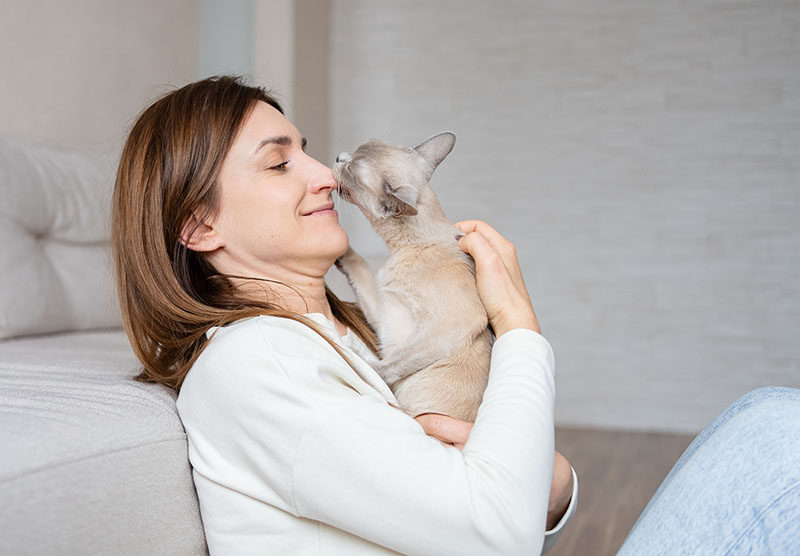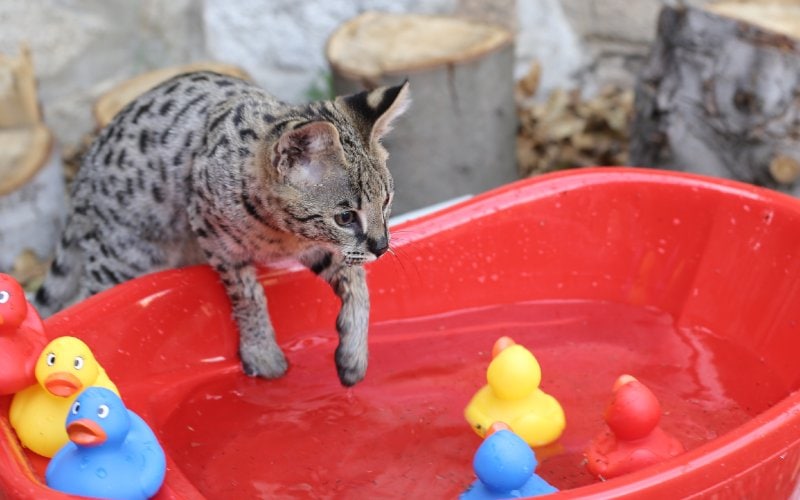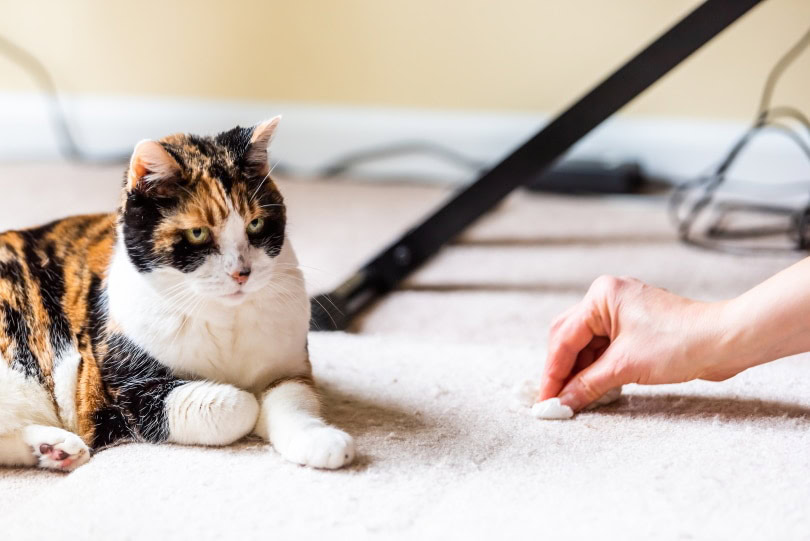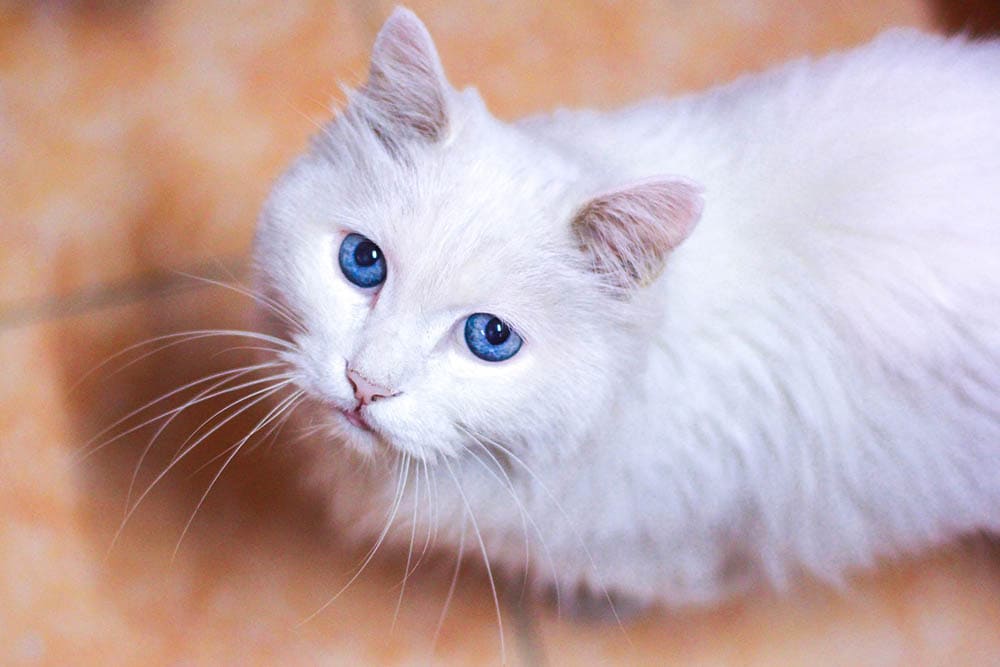VET APPROVED

The information is current and up-to-date in accordance with the latest veterinarian research.
Learn more »Click to Skip Ahead
Biting is a complicated subject. With cats, it can stem from playfulness or overstimulation to self-care, and it can be positive or negative. Therefore, pinpointing a precise reason why your cat is biting your nose may require some detective work. Or it could just be due to normal cat behavior.

The 5 Reasons a Cat May Bite Your Nose
Felines are now believed to be able to get a fairly decent sense of human emotions, based on recent research.1 They may be able to detect our facial expressions, tone of voice, gestures, and other body language cues, as well as possibly even recognize different humans by their voice alone.2 They may also view humans as equals in a sense since they greet and rub up against us the same as they would a familiar cat. With that in mind, a cat may also respond to the signals we send to them, sometimes knowingly or other times subconsciously.
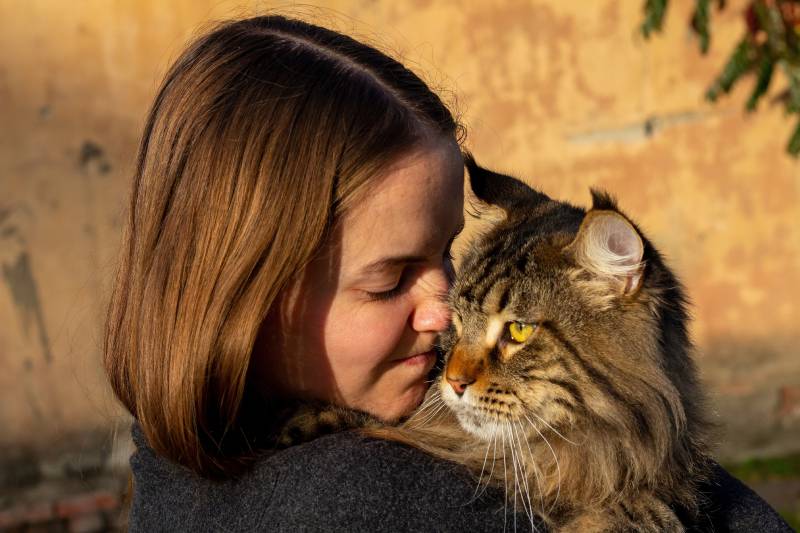
1. Playfulness and Overstimulation
Kittens play rough sometimes, rolling and tumbling on the floor, pouncing and stalking, biting at toys, and practicing how to catch prey. This behavior can get quite intense. If you pick one up after the roughhousing, they may not realize the game is over. And if you hold the kitty up to your face, your nose is the nearest point to the animal. That can also happen with an adult cat doing zoomies. Overstimulation may cause an otherwise docile pet to bite if they can’t get away from the situation. They aren’t being mean, it’s just bad timing. In most cases, they have given you other cues to reduce interaction, such as changes in their ear position or tail swishing, but maybe you missed those.
2. Attention-Mongering
Felines are able to catch on to things pretty quickly. Just ask anyone whose cat wakes them up to eat in the morning! Cats know that specific behaviors get desirable results. When your pet nips at your nose, they may be looking for attention, a treat, or a meal. Some cats are pretty persistent and demanding in getting what they want.
3. Grooming Behavior
Biting is a part of grooming. Many cats take on that task with their owners. It may start as gentle licking before a nip on your hand or nose to get the job done. Again, it’s not aggressive behavior. Felines often view their family members as part of their social group, even if what’s normal to them is abnormal to us. Your cat may just be seeing you as a companion that needs grooming.
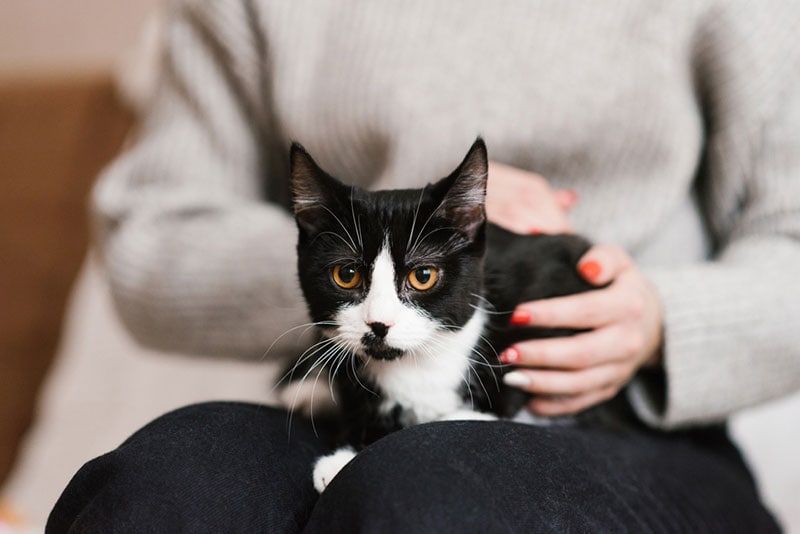
4. Showing Affection
That soft nip can also mean they’re showing affection. You may have noticed it when petting your cat. All seems well, and then, they bite, seemingly unprovoked, but very gently. This is a behavior they engage in with other cats. Instead of getting upset, realize that your pet is showing affection for you and nurturing your bond.
5. Annoyance
Some cats are born lap animals. They sit for hours soaking up all the attention and petting you give them. However, others prefer short doses. Felines are also masters at body language. If they are reaching their tolerance limit, they’ll let you know, which could result in a nip on the nose.
Signs that you should stop what you’re doing include restlessness, tail slapping, and flattened ears. We suggest gently pulling away when you notice that they’re annoyed and giving them some space.

Aggression in Cats
It’s one thing for a cat to bite your nose because they’re overstimulated or annoyed; it’s another story when it crosses the line into aggression. Several factors can cause this negative emotion. It could result from fear. A pet not used to being handled will likely fight it and may scratch or bite to get away. However, apparent warning signs precede it, such as hissing and growling.
Cats are notorious for hiding their pain. If your pet nips your nose after you tried to give them a cuddle or picked them up, the reason may lie with something that has nothing to do with you. We recommend observing your kitty for signs of limping, wounds, changes in their appetite, excessive licking, or hair loss to determine where they hurt. Make an appointment with your vet to investigate it further.
Another form of aggression may also involve poor timing. Displacing behavior or redirecting occurs when an animal gets agitated by an unrelated event or stimulus, such as your cat seeing another feline outside. The annoyance and fear build within your kitty, but woe to the person or other pet that happens to walk by when emotions are still running high. A cat usually doesn’t pick a fight but releases their tension elsewhere, unless they feel cornered or threatened.
If you are concerned about your cat’s behavior, we suggest speaking to a veterinarian. Our vets at PangoVet can help put your mind at ease.
What May Lead To Aggression
Aggression in cats is a complex issue and can be influenced by a lot of factors. From pain, underlying health issues, frustration, stress, fear, or anxiety, due to changes in their environment, multi-cat household hierarchy, and competition for resources, to early lack of proper socialization or negative previous experiences, there are a lot of factors that may influence a cat’s behavior or lead to aggression. The reed is another factor, but it’s rare that only one factor is responsible for a cat’s temperament or behavior, with environmental or outward factors playing a more significant role.
There may be certain breed predilections, such as evidenced by the research that investigated behavioral aspects and correlations between various feline breeds. Still, early socialization, providing a stable and calm environment, with adequate exercise, mental stimulation, and environmental enrichment are crucial in ensuring a cat’s wellbeing and minimizing undesirable behaviors. The study looked at the seven traits including shyness, fearfulness, and aggression toward humans. The Russian Blue scored highest for the first two and the Turkish Van for the latter.
Treatment
If your cat’s nibbling is part of their playfulness or overstimulation, it can be easily reduced, by redirecting their behavior. If they are excited and playful, ensure you are not using your hands to play with them, and do not place your head too close to their face. Let them cool off first.
If they are overstimulated, again, give them space and let them withdraw, rather than forcing them to cuddle, as this will result in an outburst. If it’s part of grooming or affection, learn to predict when it happens and take a break just in time, unless you find you enjoy these little awkward signs of affection.
However, if your cat’s nipping is very sudden or with intent, speak to your vet first. Your vet will likely begin by ruling out a physical cause for aggression, such as pain, injuries, or underlying medical conditions. Chronic joint pain, hidden wounds or cuts, and other health issues could certainly be an issue with a biting cat. Other things can also affect your pet’s mood, such as cognitive dysfunction, stress, fear, or anxiety, due to a new pet or a baby in the house.
If your vet ruled out a medical problem, they may refer you to an animal behaviorist, in order to observe your cat in their natural environment and try and establish the cause for their nipping.


Conclusion
A cat biting your nose may be only a chance occurrence. Your pet may be overstimulated from play or want attention. We suggest watching your kitty’s body language. If they are overtired or annoyed, they usually signal their displeasure first. Learn to read the signs and respect your pet’s space.
If it happens frequently, we suggest discussing it with your vet to rule out physical causes. Behavior redirection techniques can control the biting and improve your relationship with your feline companion.
Featured Image Credit: Julija Sulkovska, Shutterstock
